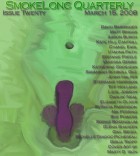Would you consider this magical realism?
If someone else had written it, yes. As it is, it seems presumptuous to label it. All I did was pick up a character in my head and follow him home at the end of a day. I saw what he saw, found what he found, felt what he felt. To him, it was very real, painful. To me, it felt oblique, strange. But at the same time I empathised and understood perfectly.
Is there import in where Shaozu finds Mei’s parts?
The one that resonated deeply was the stomach on the spare room pillow. That was saying something about a mother’s loss. And that foot, ‘lined up neatly’. Shaozu wept at that point. So did I.
Shaozu looks for her face and her heart in the bedroom. That’s important too. Aren’t we at our most honest there? And at our most vulnerable?
What is the game Wei-Ch’i?
It’s a strategic board game for two players, in which each player seeks to control the greater proportion of the board.
When I wrote it, I left the name of the game blank. Then I looked up a suitable game and filled in the blank later. It needed to be a game of strategy between two people, but needed to be correct for the cultural setting.
Your short story collection, Words from a Glass Bubble, was just released by Salt Publishing. Will you be giving readings or signings?
I’m not famous enough to do signings! But I am holding a launch party, and will of course sign books there.
I am booked to read at West Cork Literary Festival, Bantry, Ireland (home of the Fish Prize). I’m running a fun short story competition over the week for them. Great excuse to stay there for the duration. I’ve got a reading booked in Stoke Newington, London, also in July. A panel event, with my publisher answering questions about the short story today. And a few others in the pipeline.
Apart from that, I’m concentrating on small book groups. I enjoy the buzz, the cut n thrust.
While reading through the annual Kathy Fish Fellowship applications, I was struck by the number of writers who were using flash as, to paraphrase, a means to an end. Most people weren’t writing flash because they loved the form, because it took them places other types of fiction didn’t. Instead, they were using it as a gateway into longer works—short stories, short story collections, novels. As a champion of flash, I found this discouraging. Is flash fiction less satisfying, in terms of either writing or reading, than longer works? Or is it that the markets still haven’t accepted flash as a legitimate form? Why do you write flash, and where do you see it taking you?
Great flashes are diamond stuff. Perfect. They don’t leave the reader hanging, or assume another role. Strong, resonant stories packed into non-safety matchboxes.
I have a strong emotional pull to the form. It feels very natural. I’m sure they are deeply seated in our psyches, these little stories, told in snatched moments. And it’s such a joy to read a really good flash. It’s not a function of word count. It’s more to do with the magic of ‘scope’. Read a good flash and a whole world envelops you. You CAN’T turn the page and read another.
But I also see flash writing—the process—as a way of freeing up creativity. Of ‘defeating the sentinels’. Of allowing the mind free rein to produce what connections, rhythms, voices, colours and textures it wants, with as little interference from the writer as possible… no planning, no ‘conscious thought’. I am always looking for fresh ways to approach flash writing. Fresh prompt sources, whether sights, sounds, smells, textures or tastes. The lot. I use flash fiction in all my CW teaching. It’s perfect. Fast, energetic, engaging as a process.
And that process can also be used to create single pieces, or a series. I’ve written several short stories that are actually linked flashes. Yes, the markets have accepted flash as a form. My own flash collection Mood Swings will come out in 2009 through Salt Publishing. I have several collections by good strong writers. Margaret Attwood, for one! Dan Rhodes. David Gaffney. My latest addition, Rusty Barnes.
But what IS flash? They are stories that just needed to be that length, is all. The Sudden Fiction series was published in the 1980s. The form is not new, although the name ‘flash’ might be.
I think the internet is both to be thanked for bringing flash to a wider audience, in the strong ezines like Smokelong Quarterly. But sadly, I think there is also lot of meaningless tat masquerading as good fiction all over the web. Whatever length, but especially short pieces, published by ezines that can’t differentiate between good, indifferent or even bad writing. That leads writers to think they can get away with any old 250 words. And it gives short fiction and very short fiction a bad name.
Where do I see flash fiction taking me? Always somewhere surprising. And as I said in another interview recently, “If writing doesn’t surprise the writer, it sure as hell ain’t going to surprise the reader…”



 The core workshop of SmokeLong Fitness is all in writing, so you can take part from anywhere at anytime. We are excited about creating a supportive, consistent and structured environment for flash writers to work on their craft in a community. We are thrilled and proud to say that our workshop participants have won, placed, or been listed in every major flash competition. Community works.
The core workshop of SmokeLong Fitness is all in writing, so you can take part from anywhere at anytime. We are excited about creating a supportive, consistent and structured environment for flash writers to work on their craft in a community. We are thrilled and proud to say that our workshop participants have won, placed, or been listed in every major flash competition. Community works.